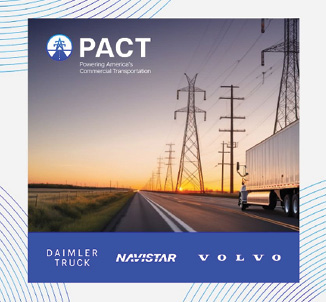
Daimler Truck North America, Navistar Inc. and Volvo Group North America lead founding members of Powering America’s Commercial Transportation (PACT), a Washington, D.C. coalition focused on education and advocacy for accelerating the construction of nationwide infrastructure for medium- and heavy-duty zero-emission vehicles (ZEVs). Company executives assembled in Washington, D.C. for a kickoff at the National Press Club, citing PACT’s “express purpose of overcoming the many barriers delaying access to ZEV infrastructure and enhancing national climate policies to address the infrastructure needs of ZEVs.”
Each truck original equipment manufacturer has battery-electric models in the marketplace, but sees access to charging infrastructure an increasingly significant bottleneck to the vehicles’ widespread adoption. PACT membership is open to all stakeholders with an interest in accelerating the deployment of zero-emission commercial vehicles and the requisite infrastructure, including other OEMs, infrastructure developers, electric utilities and grid operators. Joining the manufacturers of Freightliner, Western Star, International, Mack and Volvo truck models as founding coalition members are ABB E-mobility, Burns & McDonnell, Greenlane, J.B. Hunt Transport, Prologis Inc., and Voltera.
So far in the United States, transportation electrification has largely focused on the needs of light-duty passenger vehicles, a far different market segment that does not require the same unique considerations as medium- or heavy-duty trucks. Quickly deploying reliable and accessible ZEV infrastructure to power the nation’s commercial transportation fleet necessitates distinct considerations for capital investment, electrical grid upgrades and dedicated charging equipment. According to the International Council on Clean Transportation, nearly 600,000 chargers will support a projected 1.1 million Class 4-8 medium- or heavy-duty ZEVs anticipated to be deployed by 2030. The chargers will consume 140,000 megawatt-hours of electricity per day or the equivalent of the daily energy used by 4.9 million American homes.
“Decarbonizing the commercial transportation sector is critical to meeting our nation’s climate goals. But the transition to zero-emission vehicles is stalling without the deployment of the needed charging infrastructure,” says DTNA CEO John O’Leary. “Through PACT, we aim to accelerate this infrastructure buildout so that fleets can adopt ZEVs at scale and we can all benefit from impactful emissions reductions as quickly as possible.”
“Commercial vehicle customers require fast, reliable, affordable, and convenient power to effectively deploy ZEV fleets,” adds Navistar CEO Mathias Carlbaum. “To enable their success, we must work collaboratively across sectors to deliver an infrastructure that provides access to seamless electricity and meets the commercial transportation industry’s unique needs. PACT provides a concerted forum dedicated to making this vision a reality, truly working to accelerate the impact of sustainable mobility.”
“The scale of infrastructure required for medium- and heavy-duty EV adoption is unprecedented. Understanding and coordination across the different stakeholders is imperative to deploy chargers quickly and cost-effectively,” affirms Volvo Group North America Chairman Stephen Roy. “PACT will promote best practices to streamline this complex transition while minimizing impacts on fleets, utilities, and the economy.”
PACT will not advocate for specific vehicle, power generation, or utility distribution technologies. It exists to educate stakeholders about infrastructure challenges that hamper M/HD ZEV adoption in the marketplace and work with stakeholders to find solutions for the benefit of all interested parties.
CUMMINS, DTNA, PACCAR BATTERY JOINT VENTURE
Accelera, the zero-emissions business segment of Cummins Inc., Daimler Trucks & Buses US Holding LLC and Paccar Inc. have selected Marshall County, Miss. as the future site of an advanced battery cell manufacturing. Their planned joint venture will localize battery cell production for commercial electric vehicles and is expected to create more than 2,000 U.S. manufacturing jobs. The 21-gigawatt hour factory is expected to begin producing battery cells in 2027.
The joint venture was announced in September 2023. A transaction behind the entity is subject to customary closing conditions and receipt of applicable merger control and regulatory approvals, including the submission of a voluntary notice to the Committee on Foreign Investment in the United States. Partners aim to create scale to deliver cost effective and differentiated battery cell technology that supports the adoption of electric vehicles for medium- and heavy-duty commercial transportation. Accelera, Daimler Truck and Paccar will jointly control and each own 30 percent of the business, which will focus on lithium-iron-phosphate battery technology. EVE Energy will serve as the technology partner with a 10 percent J.V. stake, contributing LFP battery cell design and manufacturing expertise.
“This site selection represents an exciting and tangible step toward advancing our Destination Zero strategy and vision to lead the industry toward a decarbonized future,” says Cummins Chair Jennifer Rumsey. “We are excited to join the Marshall County community to drive economic growth and job creation in Mississippi, while continuing to expand our strong partnerships and serve the diverse needs of customers.”
“Localized battery cell production is an important component of delivering our customers cost effective options for decarbonizing their operations,” adds Daimler Trucks North America CEO John O’Leary.